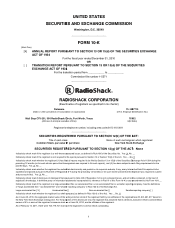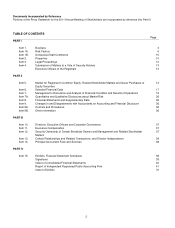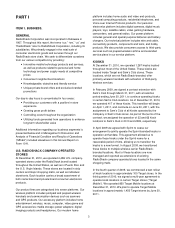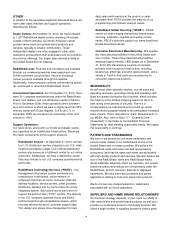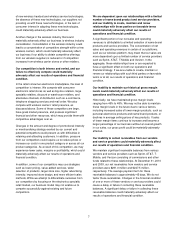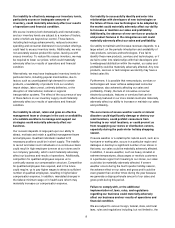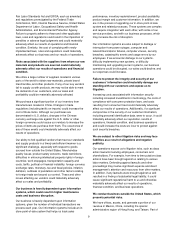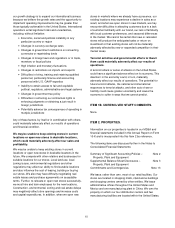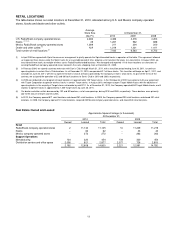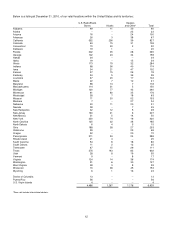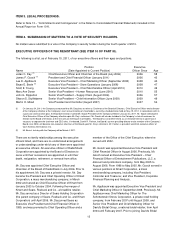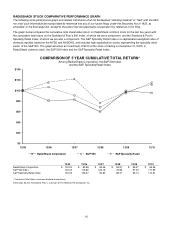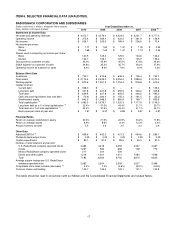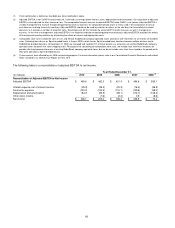Radio Shack 2010 Annual Report Download - page 20
Download and view the complete annual report
Please find page 20 of the 2010 Radio Shack annual report below. You can navigate through the pages in the report by either clicking on the pages listed below, or by using the keyword search tool below to find specific information within the annual report.10
our growth strategy is to expand our international business
because we believe the growth rates and the opportunity to
implement operating improvements may be greater than
those typically achievable in the United States. International
operations entail significant risks and uncertainties,
including, without limitation:
• Economic, social and political instability in any
particular country or region
• Changes in currency exchange rates
• Changes in government restrictions on converting
currencies or repatriating funds
• Changes in foreign laws and regulations or in trade,
monetary or fiscal policies
• High inflation and monetary fluctuations
• Changes in restrictions on imports and exports
• Difficulties in hiring, training and retaining qualified
personnel, particularly finance and accounting
personnel with U.S. GAAP expertise
• Inability to obtain access to fair and equitable
political, regulatory, administrative and legal systems
• Changes in government tax policy
• Difficulties in enforcing our contractual rights or
enforcing judgments or obtaining a just result in
foreign jurisdictions
• Potentially adverse tax consequences of operating in
multiple jurisdictions
Any of these factors, by itself or in combination with others,
could materially adversely affect our results of operations
and financial condition.
We may be unable to keep existing stores in current
locations or open new stores in desirable locations,
which could materially adversely affect our sales and
profitability.
We may be unable to keep existing stores in current
locations or open new stores in desirable locations in the
future. We compete with other retailers and businesses for
suitable locations for our stores. Local land use, local
zoning issues, environmental regulations and other
regulations may affect our ability to find suitable locations
and also influence the cost of leasing, building or buying
our stores. We also may have difficulty negotiating real
estate leases and purchase agreements on acceptable
terms. Further, to relocate or open new stores successfully,
we must hire and train employees for the new locations.
Construction, environmental, zoning and real estate delays
may negatively affect store openings and increase costs
and capital expenditures. In addition, when we open new
stores in markets where we already have a presence, our
existing locations may experience a decline in sales as a
result, and when we open stores in new markets, we may
encounter difficulties in attracting customers due to a lack
of customer familiarity with our brand, our lack of familiarity
with local customer preferences, and seasonal differences
in the market. We cannot be certain that new or relocated
stores will produce the anticipated sales or return on
investment or that existing stores will not be materially
adversely affected by new or expanded competition in their
market areas.
Terrorist activities and governmental efforts to thwart
them could materially adversely affect our results of
operations.
A terrorist attack or series of attacks on the United States
could have a significant adverse effect on its economy. This
downturn in the economy could, in turn, materially
adversely affect our results of operations. The potential for
future terrorist attacks, the national and international
responses to terrorist attacks, and other acts of war or
hostility could cause greater uncertainty and cause the
economy to suffer in ways that we cannot predict.
ITEM 1B. UNRESOLVED STAFF COMMENTS.
None.
ITEM 2. PROPERTIES.
Information on our properties is located in our MD&A and
financial statements included in this Annual Report on Form
10-K and is incorporated into this Item 2 by reference.
The following items are discussed further in the Notes to
Consolidated Financial Statements:
Summary of Significant Accounting Policies –
Property, Plant and Equipment
Note 2
Supplemental Balance Sheet Disclosures –
Property, Plant and Equipment
Note 3
Commitments and Contingencies Note 13
We lease, rather than own, most of our retail facilities. Our
stores are located in shopping malls, stand-alone buildings
and shopping centers owned by other entities. We lease
administrative offices throughout the United States and
Mexico and one manufacturing plant in China. We own the
property on which our four distribution centers and two
manufacturing facilities are located within the United States.



